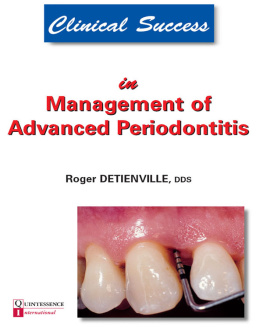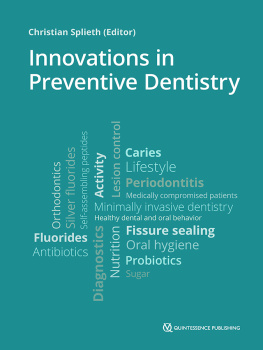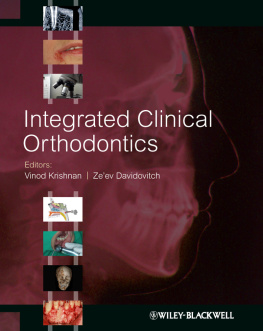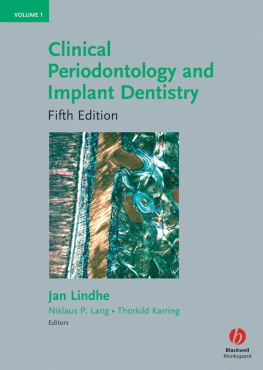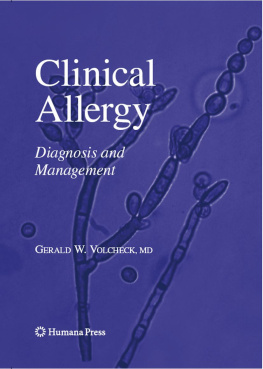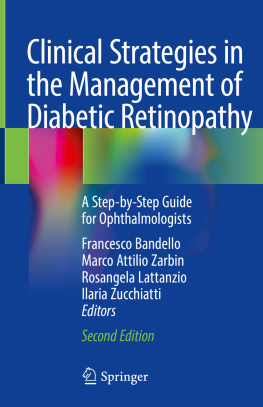Roger Detienville - Clinical Success in Management of Advanced Periodontitis
Here you can read online Roger Detienville - Clinical Success in Management of Advanced Periodontitis full text of the book (entire story) in english for free. Download pdf and epub, get meaning, cover and reviews about this ebook. year: 2005, publisher: Quintessence Pub Co, genre: Children. Description of the work, (preface) as well as reviews are available. Best literature library LitArk.com created for fans of good reading and offers a wide selection of genres:
Romance novel
Science fiction
Adventure
Detective
Science
History
Home and family
Prose
Art
Politics
Computer
Non-fiction
Religion
Business
Children
Humor
Choose a favorite category and find really read worthwhile books. Enjoy immersion in the world of imagination, feel the emotions of the characters or learn something new for yourself, make an fascinating discovery.
- Book:Clinical Success in Management of Advanced Periodontitis
- Author:
- Publisher:Quintessence Pub Co
- Genre:
- Year:2005
- Rating:3 / 5
- Favourites:Add to favourites
- Your mark:
- 60
- 1
- 2
- 3
- 4
- 5
Clinical Success in Management of Advanced Periodontitis: summary, description and annotation
We offer to read an annotation, description, summary or preface (depends on what the author of the book "Clinical Success in Management of Advanced Periodontitis" wrote himself). If you haven't found the necessary information about the book — write in the comments, we will try to find it.
Clinical Success in Management of Advanced Periodontitis — read online for free the complete book (whole text) full work
Below is the text of the book, divided by pages. System saving the place of the last page read, allows you to conveniently read the book "Clinical Success in Management of Advanced Periodontitis" online for free, without having to search again every time where you left off. Put a bookmark, and you can go to the page where you finished reading at any time.
Font size:
Interval:
Bookmark:
in
Management of
Advanced Periodontitis
Roger Detienville, DDS
Assistant Professor
Department of Periodontics
School of Dental Surgery
Ren Descartes University-Paris 5
Paris, France
English Translation by
Nicolai Johnson, DDS
Private Practice
Paris, France

 | Paris, Berlin, Chicago, Tokyo, London, Milan, Barcelona, Istanbul, Moscow, New Delhi, Prague, So Paulo and, Warsaw |
First published in French in 2002 by Quintessence International, Paris
Le Traitement des Parodontites Svres
To Monique
2005 Quintessence International
Quintessence International
11 bis, Rue dAguesseau
75008 Paris
France
All rights reserved. This book or any part thereof may not be reproduced, stored in a retrieval system, or transmitted in any form or by any means, electronic, mechanical, photocopying, or otherwise, without prior written permission of the publisher.
Design: STDI, Lassay-les-Chteaux, France
Printing and Binding: EMD, Lassay-les-Chteaux, France
Printed in France
I would like to acknowledge the colleagues listed below:
Salima Benmehdi
Claire Boski
Alain Canac
Fabrice Chrel
Michel Degrange
Cdric Fivet
Bernard Fleiter
Dominique Guez
Alain Lautrou
Thierry Perronnet
Philippe Rajzbaum
Franck Renouard
Thierry Taeb
Jean-Franois Tulasne
For their valuable help and dedication, I would also like to thank Jean-Louis Giovannoli and Jean-Marie Korbendau
| Severity of Periodontal Disease |
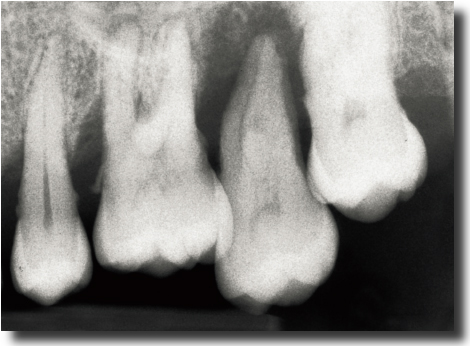
Periodontal disease is an inflammatory disease caused by a bacterial infection. It is characterized by a progressive destruction of the dental attachment tissues. Left untreated, it may lead to complete loss of dental attachment structures and subsequently loss of teeth.
The primary objective of treatment is to arrest the progressive destruction of periodontal tissue and thus to arrest loss of attachment structures. However, the infectious process involved in periodontal disease is complex. Host susceptibility and the presence of pathogenic bacterial species, whether exogenous or commensal, interact and either promote or hinder the progression of the disease. Simultaneously, numerous local or environmental factors exert an influence on the etiologic agents and the course of disease. Because of its multifactorial nature, periodontal disease is difficult to manage. In formulating treatment strategies, both the patients periodontal susceptibility and the amount of periodontal destruction need to be taken into account. Repair and regeneration have become realistic objectives in the current context of periodontal therapeutics. For this reason, a methodic assessment of severity factors is a crucial step in treatment planning.
Severe periodontal disease is characterized by:
Destruction of periodontal attachment tissue exceeding one third of the roots length
Class II or III furcation invasion
Probing depths exceeding 6 mm
Attachment loss exceeding 4 mm
Some teeth have already been lost or are unlikely to be maintained. The indication of prosthetic restorations for the replacement of missing teeth denotes the irreversible aspect of treatment in the periodontal patient. However, prosthetic rehabilitation may seem a risky endeavor in the context of uncontrolled periodontal disease. This raises several questions concerning both the disease itself and the global treatment strategy:
Is infection control possible in all forms of periodontitis?
Are there severity factors? How can they be detected? Can they be eliminated?
What are the risk factors?
What would be the best treatment strategy?
To what extent can a conservative approach be applied?
What are the different criteria that indicate the decision to extract?
When should the decision to extract be made?
What is the prognosis for the remaining teeth?
Is it possible to place implants in the context of advanced periodontal disease?
Should we carry out periodontal treatments less often and place implants more often?
What are the optimal conditions for successful therapy?
In the 1990s, the strategy consisting of root debridement with scaling and planing with or without surgical techniques and followed by periodontal maintenance every 3 to 6 months was considered the best treatment for the majority of periodontal diseases (Goodson 1994). However, the so-called refractory forms emerged; these were characterized by poor response to treatment (Figs ). In these specific cases, antibiotic therapy was recommended. Since then, however, progress in microbiologic knowledge no longer limits the use of antibiotic therapy to the refractory forms of periodontal disease. Taken together, these elements demonstrate the need for a sound understanding of the complex microbiology of periodontal disease in clinical practice.
A better understanding of the etiology and pathogenesis of periodontal diseases has allowed for the development of new guidelines for management and treatment; this represents a major step toward carrying out treatment strategies better suited to individual patients. An increasingly specific approach, taking into account factors such as patient susceptibility, features of periodontal infection, and individual severity factors, will no doubt lead to a reduction of the number of refractory forms and lay out a clinical context favorable to tissue response.
The American Academy of Periodontologys 2000 classification now serves as a reference. Periodontal disease treatments should be carried out in accordance with the diagnostic criteria specified in this classification. Advanced periodontitis is most often observed in younger patients, though it does not represent a distinct clinical subset; it is observed in chronic and aggressive forms of periodontal disease, both of which represent the principal subunits of the new classification. In the case of chronic periodontitis, treatment is relatively straightforward: the infection is characterized by a significant amount of plaque buildup and features a predominant commensal bacterial population with local aggravating factors. In the case of aggressive periodontitis, a more specific protocol must take into account the involvement of a more complex bacterial flora, specific patient susceptibility factors, and additional risk factors. Here again, formulating a precise diagnosis is a crucial step in patient management.
Defining treatment success in periodontal practice represents a difficult task. It implies both complete elimination of infectious processes and associated inflammation as well as durable prevention of recurrence in all previously pathologic periodontal sites. Infection control is the key to success, though it is the aspect of treatment that is most difficult to accomplish. The ultimate goal is durable restoration, both esthetic and functional, while attempting to avoid the use of partial dentures.
Currently, there is a strong incentive toward the application of evidence-based solutions and techniques. However, statistical analysis is more difficult to carry out in the clinical setting than in the context of pure research. Clinical practice can therefore demonstrate its efficacy and ultimately point out elements of scientific truth through interpretation of scientific information.
Font size:
Interval:
Bookmark:
Similar books «Clinical Success in Management of Advanced Periodontitis»
Look at similar books to Clinical Success in Management of Advanced Periodontitis. We have selected literature similar in name and meaning in the hope of providing readers with more options to find new, interesting, not yet read works.
Discussion, reviews of the book Clinical Success in Management of Advanced Periodontitis and just readers' own opinions. Leave your comments, write what you think about the work, its meaning or the main characters. Specify what exactly you liked and what you didn't like, and why you think so.

